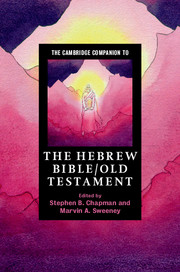Book contents
- Frontmatter
- Contents
- List of Tables, Maps, and Figures
- List of Contributors
- List of Abbreviations
- Introduction
- Part I Text and canon
- Part II Historical background
- Part III Methods and approaches
- Part IV Subcollections and genres
- Part V Reception and use
- Index
- Cambridge Companions to Religion (continued from page iii)
Introduction
Published online by Cambridge University Press: 05 July 2016
- Frontmatter
- Contents
- List of Tables, Maps, and Figures
- List of Contributors
- List of Abbreviations
- Introduction
- Part I Text and canon
- Part II Historical background
- Part III Methods and approaches
- Part IV Subcollections and genres
- Part V Reception and use
- Index
- Cambridge Companions to Religion (continued from page iii)
Summary
A remarkable diversification of religious scholarship occurred in the course of the twentieth century, uniquely affecting research on the Hebrew Bible or Old Testament. Once a relatively staid field framed within largely Protestant assumptions and expectations, Hebrew Bible/Old Testament scholarship has become a lively academic terrain of robust activity by Protestants, Catholics, Jews, secularists, and others. Although still underrepresented, women and racial or ethnic minorities are thankfully now increasingly part of the scholarly conversation.
Moreover, the institutional context of this activity has also broadened significantly, with most of the work in the field currently being done at research universities (which might have religious studies departments and/or denominationally affiliated schools of religion or theology) rather than in free-standing theological schools. University religion departments routinely now include Jewish and Catholic biblical scholars, as well as scholars without any religious affiliation, and their students range across an extremely broad spectrum of religious backgrounds and commitments:
There has been a major shift of the locus of biblical scholarship from Christian and Jewish theological faculties to the “secular” universities. University scholars in the field of biblical studies have not ceased universally to be Christians or Jews in their personal profession. Religious identity as Christian or Jewish still informs in many ways the views of biblical interpretation by such scholars. Now, however, these views must be expressed in an arena of scholars who represent various shades of Christian and Jewish life.
Indeed, the diversification of the field has gone hand in hand with the dizzying institutional complexification of the modern university.
As this diversification has continued, the object of study in Hebrew Bible/Old Testament research has become increasingly challenging to define. Because alternative conceptions of the biblical canon exist, which books are to be included for investigation? Because different text traditions are variously valued, is the field's interpretive goal the elucidation of the Hebrew Bible, Greek Bible, or some combination of the two? Or is “Bible” itself a problematic category? Even the name of the field has become unstable. “Old Testament” suggests a network of Christian hermeneutical presuppositions, a possible bias that has led to the increasing use of “Hebrew Bible,” especially (but not exclusively) on the part of Jewish scholars.
- Type
- Chapter
- Information
- Publisher: Cambridge University PressPrint publication year: 2016
- 1
- Cited by



